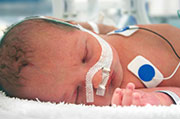
WEDNESDAY, Feb. 5, 2014 (HealthDay News) — Adults who were born prematurely and had breathing problems after birth might still have breathing issues in adulthood, according to a small new study.
However, the problems might become evident only in situations in which oxygen levels are lower than normal, such as traveling to a high altitude, the researchers said.
“All of the individuals we studied looked completely normal,” said study lead author Melissa Bates, an assistant scientist in the department of pediatrics at the University of Wisconsin, Madison. “They had no apparent long-term consequences from prematurity until their respiration was stressed. They had very impaired responses to low-oxygen stress.”
People who travel to high-altitude areas typically increase their breathing rates to compensate for the lower amount of oxygen in the air, Bates said. Yet two of the 13 adults who participated in the study actually slowed down their breathing when exposed to low oxygen levels.
Bates said the impaired breathing response might increase the risk of sleep apnea in people who had breathing problems as preemies. They might also experience breathing problems at high altitudes and when coming off of anesthesia after surgery, she said.
Results of the study are scheduled for publication in the Feb. 6 issue of the New England Journal of Medicine.
Each year in the United States, about one of every eight babies is born prematurely, according to the U.S. Centers for Disease Control and Prevention. A premature infant is one born before 37 weeks’ gestation. Premature babies may face a number of challenges, such as developmental delays and problems with breathing, feeding and vision, according to the CDC.
About 30 percent of premature infants develop a chronic lung condition called bronchopulmonary dysplasia.
Infants who have to be on a mechanical ventilator, those who have a lung infection or inflammation, and those who were given high levels of oxygen at birth are more likely to develop bronchopulmonary dysplasia, according to a review article by Bates and her colleagues. That article was published in the October 2013 issue of the journal Respiratory Physiology & Neurobiology.
Bates and her colleagues are working on a larger study in which they’re looking at heart and blood vessel function in infants born prematurely between 1988 and 1991.
The current study included 13 adults from the larger study, all of whom were born prematurely. The average gestation was at or greater than 32 weeks, and they weighed an average of about 3.3 pounds. Their current average age is 21 years, according to the study.
At the time these people were born, all premature infants were placed on mechanical ventilators and received 100 percent oxygen saturation, Bates said. For a premature infant, 100 percent oxygen is a high level.
During exercise testing, the study participants didn’t show any abnormal breathing responses, Bates said. But when the researchers simulated low oxygen levels, the normal breathing response was impaired. In two of the participants, it was reversed — they breathed less when faced with low oxygen, instead of more.
Although the study found an association between premature birth and breathing problems in adulthood related to low oxygen levels, it did not establish a cause-and-effect relationship.
Bates said a colleague had studied this phenomenon in rats and found a similar response. “If you put rat pups in a high-oxygen environment when they’re born, it prevents a normal breathing response to low oxygen,” she said.
Sensors in a collection of tissues in the neck normally maintain the body’s oxygen levels, Bates said, sending signals for increased breathing in response to low oxygen, among other functions.
“That bundle of neurotissue is an important oxygen sensor,” Bates said. She added that it appears the neck tissues might not have developed properly in these preemies, due to their early birth and their environment.
She said it’s not clear what the long-term implications might be, and this is an area that needs further research.
The researchers said, however, that it’s important for primary-care doctors to be aware that some of their patients might have a greater risk of breathing problems, particularly in low-oxygen situations. Adults who were born prematurely should always let their doctors know about their early birth, Bates said.
Dr. Deborah Campbell, director of neonatology at the Children’s Hospital of Montefiore, in New York City, said it’s important for internists and family physicians to know if their patients were born prematurely.
“Prematurity is lifelong,” Campbell said. “This study shows there are residual effects even in babies who may not be that severely preterm. They may not have lung disease that causes symptoms as they age, but there may be residual abnormalities on lung-function tests.”
During pregnancy, infants commonly have low oxygen levels, Campbell said.
“When a baby is in the womb, it doesn’t even breathe when sleeping,” she said. “If they’re born prematurely, the control centers in the brain that tell them to keep breathing are still immature.”
If a baby is then exposed to high oxygen levels, Campbell said, “it may depress the drive to breathe, and these babies may not develop the normal protective responses to low oxygen.”
More information
Learn more about health problems that premature babies face at the American Academy of Pediatrics.
Copyright © 2025 HealthDay. All rights reserved.

